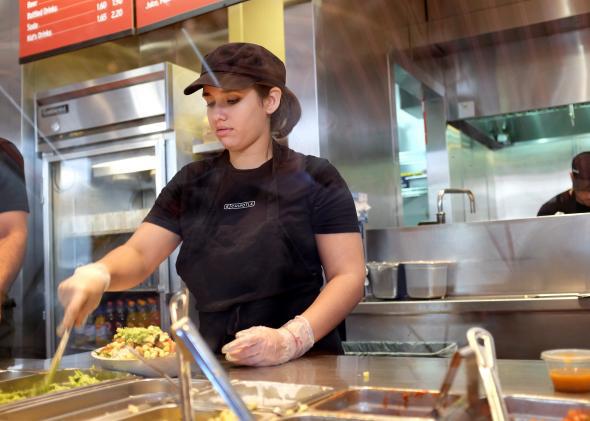Chipotle, America’s favorite fast-casual Mexican chain, wants your burrito to be high-quality and guilt-free. And the company thinks it’s getting closer to that, announcing Monday that ingredients containing genetically modified organisms have finally been eliminated from its menu. Everything Chipotle serves up can now be made from just 46 different ingredients “that could be purchased at any local supermarket,” the chain says, except for its tortillas, which still contain additives, and which Chipotle says it’s working to reformulate so that they can be GMO-free yet still support the tremendous weight that a Chipotle burrito must bear.
Already, Chipotle’s decision is being hailed as an “industry breakthrough.” It shouldn’t be.
GMOs are nearly ubiquitous in American agriculture, especially in ingredients that are vital to Chipotle menu items. In 2014, 94 percent of soybeans and 93 percent of corn grown in the U.S. were genetically engineered, according to the Department of Agriculture. Chipotle has historically used soybean oil to cook its chips and taco shells. Corn, of course, is in corn tortillas and the corn that can be added to entrée items. Shifting away from GMO-ingredients “did not result in significantly higher ingredient costs for the company,” Chipotle notes, and will not result in price increases for consumers. (Although Chipotle does plan to raise the price of some burritos this year because of rising meat costs.)
“There is a lot of debate about genetically modified foods,” Chipotle founder and co-CEO Steve Ells said in a statement. “Though many countries have already restricted or banned the use of GMO crops, it’s clear that a lot of research is still needed before we can truly understand all of the implications of widespread GMO cultivation and consumption. While that debate continues, we decided to move to non-GMO ingredients.”
On this point Ells is right—there is a lot of debate about GMOs, and a lot research is still needed to fully understand their implications—which might explain why the announcement also feels a bit like Chipotle jumping on the popular but scientifically dubious anti-GMO bandwagon. While there’s little evidence to suggest that GMOs in and of themselves are harmful, Americans overwhelmingly fear them. A recent study conducted by the Pew Research Center and the American Association for the Advancement of Science found that 88 percent of AAAS scientists considered GMO foods “generally safe,” compared with just 37 percent of the public. Slate has previously called GMO opponents the “climate skeptics of the left.” Then again, until very recently, their ranks also included the likes of Bill Nye.
Chipotle is framing the move away from GMOs as a logical next step in its mission to sell “food with integrity.” “We are always looking to find the very best ingredients we can, and have a long history of achieving things that no other restaurant companies have,” Chris Arnold, a company spokesman, said in an email. That includes “responsibly raised” and antibiotics-free meat, local and organically grown vegetables, and dairy products made with milk from cows raised without synthetic hormones like rGBH. “For too long, these better ingredients have been available only in high-end restaurants and specialty food markets, but we think that everyone should have access to really great food,” Arnold continued. “It’s how we are changing the way people think about and eat fast food.”
Perhaps, but is that really changing the way people think about food for the better? GMOs have the potential to do a tremendous amount of good. Genetic engineering can help plants resist drought and combat disease and can help societies tackle complex malnutrition problems. So far as there are known problems—such as contributing to super-pesticide resistant bugs—they’re worth considering. But by broadcasting its decision to go GMO-free, Chipotle is condoning the notion that GMOs are bad, much in the way Whole Foods evangelizes pseudoscience by stocking its shelves with books about herbal medicine and homeopathic remedies.
What’s weird in Chipotle’s case is that up until now the chain has had a fairly strong track record on these decisions. Supporting local produce growers and cutting hormones from meat are things that the public and scientists alike will cheer. Chipotle had also disclosed that its food contained GMO ingredients since March 2013. But disclosing and eliminating are two different things. With the latter, Chipotle may be taking the anti-everything-that-isn’t-natural craze a little too far.
